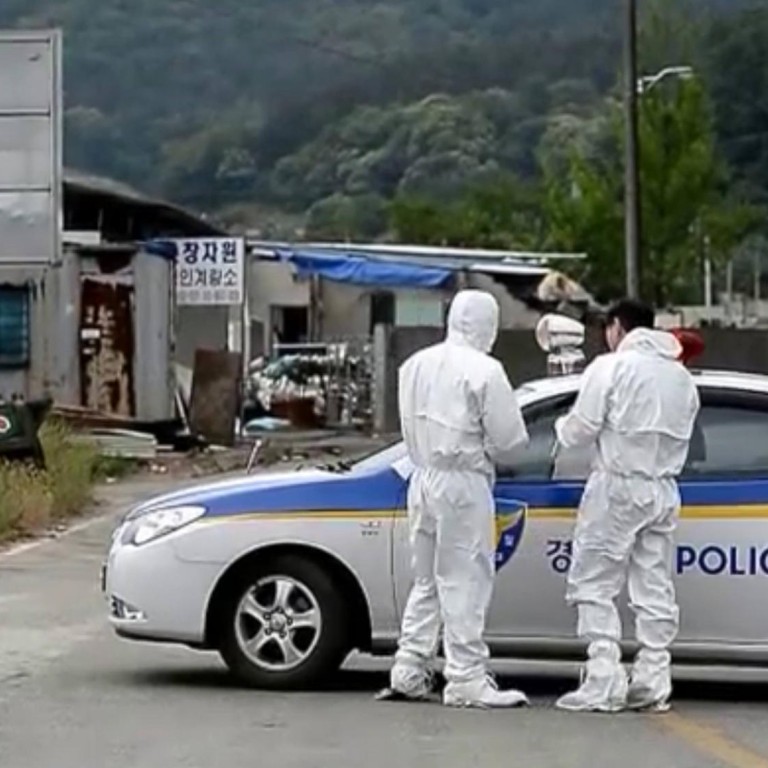
Update | Town quarantined in South Korea as Hong Kong expert blasts WHO on Mers response
South Korea reported its fifth death from MERS and number of infections rose to 64
An entire town has been quarantined in South Korea in a fresh scare over Middle East respiratory syndrome (Mers), as the World Health Organisation comes under renewed criticism from a leading Hong Kong infectious diseases expert.
The number of infections rose to 64 after 14 new cases, including one death, of Middle East Respiratory Syndrome (MERS) were confirmed last night, the country's health ministry said.
With public health and infection protection experts due to arrive in Seoul today and tomorrow to discuss ways to control the outbreak, Dr Ho Pak-leung, a microbiologist at the University of Hong Kong, said the WHO's response to the Mers crisis in South Korea showed it was not fit to "tackle emergencies."
In a test for the South Korean government and WHO's ability to resolve the crisis, Ji-hye, a town in the southwestern county of Sunchang, was placed under the control of health authorities and put under quarantine on Friday.
A 72-year-old woman who tested positive for the virus in South Korea ignored an order to stay at home in isolation and travelled into the town, where she is believed to have come into contact with more than 100 people.
The incident raised fresh questions over Seoul and the WHO's handling of the outbreak.
"WHO is not positioned for tackling emergencies, but rather promulgating macro measures," Ho said.
It relied on individual countries to report outbreaks, meaning it can't respond until it had possession of that information, he said. Also, WHO experts travel to the affected area from all over the world, as opposed to local response teams that Ho said would better understand the situation.
Ho described the organisation's response as weak in comparison to the severe acute respiratory syndrome (Sars) epidemic in the city 12 years ago. "Hong Kong has been handling the incident rather well," Ho said, as the city's Centre for Health Protection has taken enhanced precautionary measures, such as mandatory quarantines for people with respiratory symptoms.
"Quarantine and contact tracing are all effective [measures] in Hong Kong now," he said.
The United Nations global public health body last Wednesday urged Hongkongers who come into contact with infected patients to isolate and monitor themselves. But it recommended no mandatory quarantine.
Some 3,000 people are now quarantined across South Korea as the police consider forced detention to help overcome the virus. On Saturday, nine more new Mers cases emerged, raising the total infected to 50, including one citizen who exported the outbreak to mainland China through Hong Kong.
Secretary for Food and Health Dr Ko Wing-man said South Korea was sharing some case information, but urged the government to be fully transparent.
He said if the number of third-generation cases kept growing in South Korea, the risk of an outbreak in the community would increase. So far, most cases have come from hospital infections.
Ko said he would pay close attention to the incident, and would not exclude the possibility of urging people to avoid travel to South Korea in future.
With the WHO-led delegation expected to start work in Seoul for a week, Ho said he expected further measures would follow after the experts had done their investigative work in Seoul.
Ho said the global health watchdog lacks enforcement strength. "Regulations of the WHO [on quarantine] are rather vague," he said, as the interpretation of the regulations depends on each country's understanding of infection control.
He cited the case of an American nurse, who ignored a quarantine order last October when she returned to the United States from the Ebola-hit Sierra Leone, as an example of the WHO's less stringent stance on quarantine. The nurse, who showed no symptoms but was asked to stay in isolation, said the order violated her human rights.
Meanwhile, the WHO maintains no "special procedures" for travel restrictions into South Korea. The United Arab Emirates became the first country to warn its citizens not to travel there.
Complicating the current outbreak is the fact Mers - which has neither a vaccine nor a cure - features such common flu-like symptoms as fever, coughing, shortage of breath and sometimes nausea, diarrhoea and or vomiting. Moreover, its exact transmission mechanism is unknown, though it is believed to spread by coughing.


